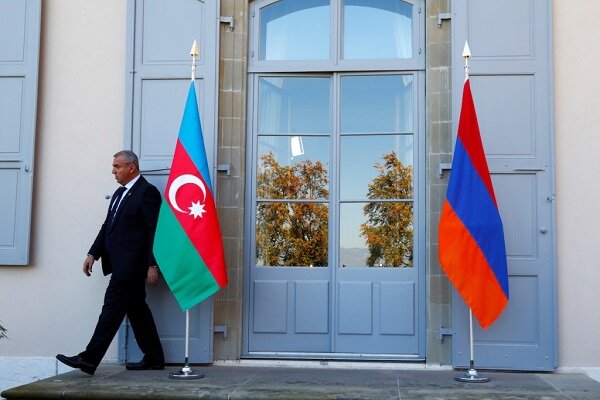Ahmad Kazemi told the Strategic Council on Foreign Relations that the foreign minister of Azerbaijan Republic is interested in cooperating with Iran, Russia and Turkey.
He said that Elham Aliyev’s emphasis on cooperation between the three Caucasus countries and its three neighboring countries in the form of a model known as the 3 + 3 cooperation model is considered a positive stance.
“it is expected that the emphasis of the Azerbaijan Republic on the 3+3 model of cooperation is beyond the policies applied by this country and we would witness measures which would indicate this country is interested in collective and regional political cooperation instead of reliance on the Zionist regime or foreign powers.”
He added that considering what we have witnessed recently, including some strange behavior of the Republic of Azerbaijan, especially in relation to the movement of Iranian trucks on the Qapan-Goris road and Iran’s transit connection with Armenia and Georgia, optimism about the recent statement of the Azerbaijan President is difficult.
Azerbaijan’s transit restrictions violate international conventions
Kazemi said Azerbaijan’s behavior in creating restrictions for the movement of Iranian trucks to Armenia, Georgia and Russia is regrettable and unprecedented.
He added that this country has committed this act and arrested two Iranian drivers in a situation where, first, the main territory of the Republic of Azerbaijan with Nakhchivan has been connected through Iran for more than 30 years and the Republic of Azerbaijan freely and without hassle is transferring about 500 trucks a day of basic goods, fuel and equipment to Nakhchivan while the air corridor between Azerbaijan and Nakhchivan passes through Iran.
“It was expected that Azerbaijan would observe the rules and conventions of international relations vis-à-vis the strategic support of Iran to that country”.
Azerbaijan’s behavior against political, moral and good neighborliness principles
This analyst of the Caucasus issues said such behaviors by Azerbaijan is not compatible with any political, moral and good neighborliness principles, adding that “such conduct includes violations of a number of international conventions, including the Goods Transit Convention, which was ratified in 1956 and to which Armenia, the Republic of Azerbaijan and Iran are party. By doing so, the Republic of Azerbaijan has explicitly violated the Customs Convention on the International Transit of Goods, known as the ITI Convention, ratified in 1971 in Vienna.”
He added that Mr. Aliyev said that because that part of the Goris-Gapan road is located in the territory of the Republic of Azerbaijan, the country has the right to impose taxes and customs duties; Apparently, the President of the Republic of Azerbaijan is not even aware of the conventions to which his country is a party, and it shows that the Republic of Azerbaijan has acted on this basis for political purposes.
Kazemi said in political procedures, when countries want to make a new decision, they can announce it through official notes and channels, and violent action is not in line with any procedure. In such circumstances, one of the examples of the Republic of Azerbaijan’s adherence to the 3 + 3 model of cooperation, which is emphasized by them, can be the reconsideration of this action against the good neighborliness that they have done.
“It is expected that if the Republic of Azerbaijan adheres to this model of cooperation in practice, it would make changes in some approaches and reconsider the use of some words, one of which is refraining from using forged, baseless and fabricated terms such as “Zangzur corridor” which is a territorial claim to another country that is the Sionik Province and Maghri of Armenia.
He said if the Republic of Azerbaijan is really looking for transport lines and connecting roads in the region, instead of raising controversial and dubious issues, it should seek the real connection of the transportation hubs in the region, as if Armenia has also declared its readiness for the Republic of Azerbaijan to be able to use its roads and railways.
He added that before Mr. Aliyev, Mr. Erdogan had also emphasized this model, but the fact is that the 3+3 cooperation model is an Iranian initiative that was proposed by Iran more than two decades ago, and emphasis on the proposed Iranian model based on group interaction is considered a positive step.
Referring to the readiness of Azerbaijan to conduct border negotiations with Armenia, he said any attempt to change the international borders and change the geopolitics in the region is considered Iran’s red line and this red line has always been announced. On the other hand, the Secretary of the National Security Council of Armenia has stated that the country will not under any circumstances be subject to a plan that includes border changes or the so-called creation of corridors, and has announced readiness to negotiate with the Republic of Azerbaijan to open transport lines.
He said negotiation of transport lines is far from the imagination of the Republic of Azerbaijan and Turkey with the focus on pan-Turkish plans.
“Countries in the region need to keep in mind that precisely defining borders is a time-consuming process; Despite the fact that more than 30 years have passed since the independence of the Republic of Azerbaijan, Armenia and Georgia, many border areas of the Republic of Azerbaijan with Georgia are still not demarcated and there are disputes over some border points between the two countries as well as between Azerbaijan and Russia.”
The fact that the Republic of Azerbaijan seeks to determine its border with Armenia so quickly is different from its treatment of Georgia and Russia and may lead to other political analyzes, he said, adding that in this situation, Iran and Russia emphasize the restraint and patience of the countries in the region in determining the border lines by detailed technical and expert studies.










0 Comments